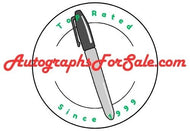Way back when I first started selling online more than 15 years ago, there were essentially two types of NFL football jerseys the general public could buy: AUTHENTIC with stitched cloth tackle twill name and numbers, and REPLICA with screen printed name and numbers.
Each NFL team contracted with its own manufacturer, and sometimes changed between seasons, resulting in a mish-mash of brands: Adidas, Champion, Nike, Puma, Russell Athletic and Starter, among others, all made officially licensed NFL jerseys during the 1990s. In 2002, Reebok signed a 10 year contract with the NFL to become the official jersey supplier for all its teams. Many of the signed and unsigned NFL and college football jerseys offered on AutographsForSale.com were blank licensed jerseys from one of these companies that were professionally stitched with real cloth tackle twill name and numbers.
In 2012, Nike took over by signing a 5 year contract. Mitchell and Ness retained the license to produce obsolete (throwback) NFL jerseys of players who they contracted with individually. As global commerce has increased, things have gotten much more complicated, primarily due to the flood of bootleg, knockoff and counterfeit "authentic" jerseys coming from Asia priced at a fraction of the real thing. Perhaps the most forged sports jerseys are Mitchell and Ness because the real ones retail for hundreds of dollars which are unaffordable for many fans.
If you are buying a jersey just to wear, don't care much about quality, don't intend to get an autographed sports jersey, and don't intend to ever get it cleaned or laundered, then bootlegs are probably an acceptable option. If not, you should avoid counterfeit sports jerseys. The poor quality is usually noticeable once compared to a real jersey. The colors are usually off. In the photo of Chargers jerseys above, note the deep blue color of the real jersey (left) vs. the muted blue on the fake (right). But even if the colors match, the name and numbers will almost always appear shiny and wrinkly instead of flat and smooth. That's because they are made of cheap vinyl or plastic made to resemble cloth fabric. If you get the jersey signed, it could very well bleed and/or fade. If you put it in the wash or send it to a dry cleaner, the vinyl or plastic may not survive intact.
Earlier this year ESPN Outside the Lines ran a piece that shone a bright light on this problem. The bootlegs are everywhere on Amazon, eBay and the internet in general. If you use Facebook, the ads on the right side often advertise websites that sell fakes. It's often hard to detect the bootlegs because the sellers frequently use images of REAL jerseys to sell fakes.
If you're trying to avoid forged sports jerseys -- and this applies to "authentic" MLB, NBA and NHL jerseys too -- my best advice is simple. If the price is too good to be true, it probably is. If the jersey is being shipped from anywhere in Asia, it's almost definitely a counterfeit sports jersey. Unfortunately, bootlegs have spread beyond the internet and can now be found at many legitimate retail stores who either don't know or don't care that they're selling fakes. And in these cases, the prices may not be suspiciously low, so buyers are getting doubly screwed.
Complicating matters are the introduction of NBA "Swingman" type semi-authentic licensed NFL jerseys with stitched name and numbers. Typically these jerseys are distinguishable from authentic jerseys by the lack of layering on the numbers -- the contrasting outline color will be part of the number instead of a separately stitched layer.
On AutographsForSale.com we strive to sell only authentic jerseys whether they are signed or unsigned. However, we use terms like replica, semi authentic, authentic style and game model which may be confusing so if you have any questions about any jersey listed for sale, just call, text or e-mail. In the meantime, you can find more about identifying bootleg jerseys elsewhere on the internet by Googling "fake Nike NFL jerseys" or "fake Reebok NFL jerseys."



